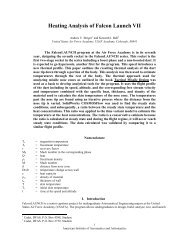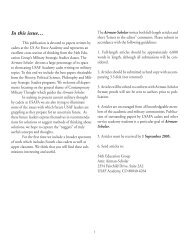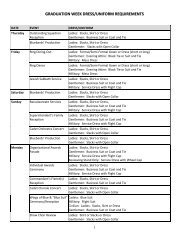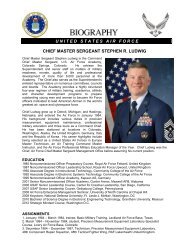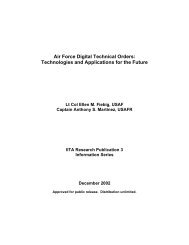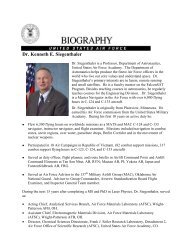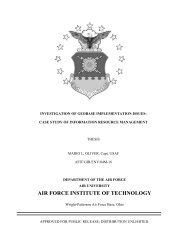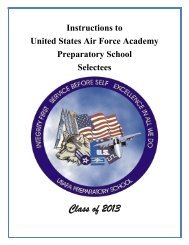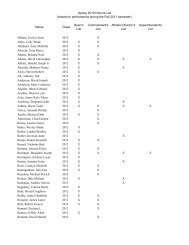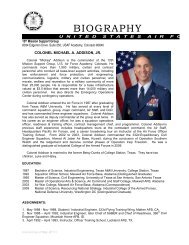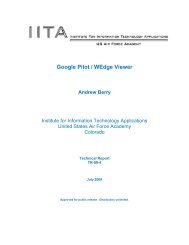the rollback of south africa's biological warfare program
the rollback of south africa's biological warfare program
the rollback of south africa's biological warfare program
You also want an ePaper? Increase the reach of your titles
YUMPU automatically turns print PDFs into web optimized ePapers that Google loves.
hinoceroses for <strong>the</strong> horns in Chiwore game reserve and that <strong>the</strong>y were illdisciplined,<br />
bored, and poorly trained. The first SAP contingents were relieved<br />
after three months. South Africa attempted to solve <strong>the</strong> problem by sending<br />
better-trained and more English speakers to Rhodesia. Tensions developed<br />
again as Rhodesians increasingly had to rely on South African manpower and<br />
military hardware in <strong>the</strong> early 1970s. Many Rhodesian troops resented South<br />
African efforts to tell <strong>the</strong>m how to conduct <strong>the</strong>ir counter-insurgency<br />
campaigns. These tensions were one reason why <strong>the</strong> South African police<br />
presence was reduced during <strong>the</strong> 1970s [Interview, Defense Intelligence<br />
Agency (DIA) <strong>of</strong>ficials, Washington, D.C., 13 September 2000]. See also<br />
Ellert, The Rhodesian Front War and Ron Reid-Daly, with Peter Stiff, Selous<br />
Scouts: Top Secret War (Alberton, South Africa: Galago, 1983) for detailed<br />
accounts <strong>of</strong> <strong>the</strong>se tensions.<br />
17 Reid-Daly, Selous Scouts.<br />
18 Ellert, The Rhodesian Front War. He claims that <strong>the</strong> Selous Scouts<br />
experimented with throwing cholera viruses in rivers but could not detect any<br />
adverse effects associated with this experiment. He reports that in 1976, a<br />
group <strong>of</strong> Scouts moved into <strong>the</strong> Ruya wildlife area near Mozambique and<br />
introduced measured quantities <strong>of</strong> bacteriological cultures into <strong>the</strong> water at<br />
several points along <strong>the</strong> Ruya river. Although <strong>the</strong> Scouts never knew if any<br />
fatalities resulted from <strong>the</strong>se experiments, Ellert notes that <strong>the</strong>se experiments<br />
corresponded in time with reports <strong>of</strong> deaths among people living on <strong>the</strong> banks<br />
<strong>of</strong> <strong>the</strong> Ruya River in Mozambique. These deaths were <strong>of</strong>ficially attributed to<br />
cholera (12).<br />
19 Mangold, Plague Wars, 214-218.<br />
20 Interview with Jakkie Cilliers, Director <strong>of</strong> <strong>the</strong> Institute for Security Studies<br />
(ISS), Pretoria, 12 June 2000. The South African State in <strong>the</strong> Basson trial is<br />
planning to use information ga<strong>the</strong>red by journalists to support charges against<br />
Basson related to <strong>the</strong> use <strong>of</strong> CBW in Rhodesia. However, <strong>the</strong> prosecution was<br />
unable to discuss this evidence while <strong>the</strong> trial is ongoing. Interview, Pretoria,<br />
July 2000).<br />
21<br />
Ellert, The Rhodesian Front War, 90-3; Interview with Peter Stiff, 12 July<br />
2000.<br />
22 From 1978 until independence <strong>the</strong> South African intelligence service<br />
stepped up <strong>the</strong>ir efforts to recruit experienced Rhodesian Special Forces,<br />
Ellert, 90.<br />
23 Jacques Pauw, Into <strong>the</strong> Heart <strong>of</strong> Darkness (Johannesburg: Jonathan Ball,<br />
1997). South Africa. Truth and Reconciliation Commission, Truth and<br />
94




